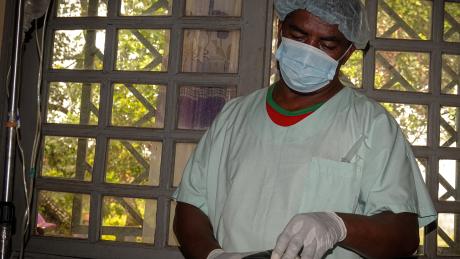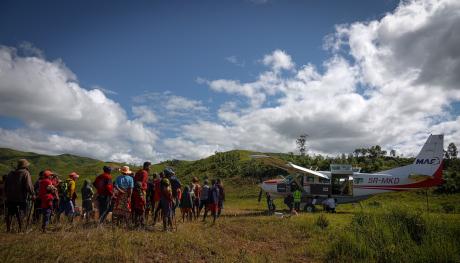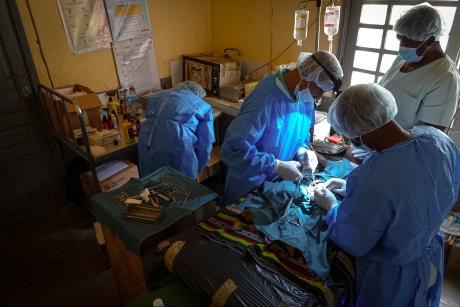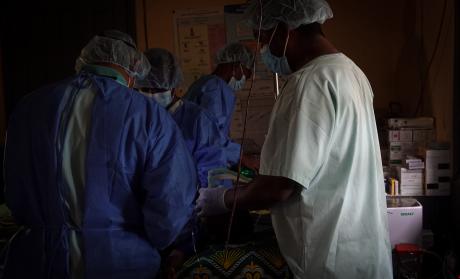
After a long day of bringing help and healing to an isolated community in Madagascar, a HoverAid medical safari team flown by MAF were called into action for a very special delivery.
Anaesthesiologist Olivier Rakotomampianina and his teammates were sitting down to dinner at the end of a big day of providing healthcare to patients in the remote village of Sahakevo in eastern Madagascar.
But a knock at the door alerted the visiting medics to an emergency. A woman in the village was in labour and, due to her medical history, a Ceasarian section was the only hope for a safe birth.
Olivier said his part in these procedures becomes particularly stressful when dealing with vulnerable patients, such as babies or the elderly.
The doctors quickly gathered their equipment, found a generator to provide light, and rushed back to perform the procedure. The tension was high as the woman had previously suffered two miscarriages.
After a long wait, the sound of a newborn’s cry filled the air, bringing a wave of relief and gratitude. The team’s quick response meant they were able to save the lives of both mother and her newborn.
Olivier said his part in these procedures becomes particularly stressful when dealing with vulnerable patients, such as babies or the elderly.
"I have to be more careful with them," he added
I have to be more careful with them
The HoverAid MMS (Madagascar Medical Safari) team flew towards the remote village of Sahakevo in a MAF aircraft from the capital Antananarivo. But even after the MAF flight landed them close to the area, the team still needed to continue the journey by canoe and a long walk, with villagers helping to carry their equipment.
Flying with MAF saved two days of travel by road that would have cost the medical team precious time.

Olivier, who joined Hover Aid and has completed more than 15 trips with the team, understands the difference an MAF flight makes in reaching isolated communities. Unlike his teammates, he travels to some locations by road on a motorbike.
It takes him up to two days of travel through rough terrain to reach some places like Sahakevo, due to adverse weather conditions and bad roads involving steep descents.
Although Olivier loves the adventure by road, he said “flying makes a big difference, especially when it is far.”
flying makes a big difference, especially when it is far
The anaesthesiologist has a critical role in the operating room. Olivier's expertise lies in the delicate balance of putting patients to sleep, maintaining their stability throughout the procedure, and waking them up once the surgery is completed.
In remote areas where MAF flies the medical safaris, the team often lack equipment so Olivier’s work will require him to make precise calculations, and constant vigilance. Olivier relies on an oxygen extractor that pulls oxygen from the ambient air, a critical tool in his practice.
"My primary responsibility is to ensure my patients feel no pain during surgery," Olivier said.

The local population, many of whom had walked for days, awaited medical assistance, hoping for treatment and surgeries when the team arrived.
MAF Madagascar has been flying medical safaris for over ten years, working closely with HoverAid.
Before any surgery the team carries out, Olivier reassures his patients, explaining the procedure and the anaesthesia process.
In well-equipped hospitals, oxygen and other necessary resources are readily available. However, the MMS team often work in challenging conditions while providing services in remote areas.

A critical aspect of Olivier's job is understanding the specifics of the surgery, including its duration and the needs it entails.
Any change in the patient's condition, which can occur rapidly within 5 to 15 seconds, necessitates immediate action.
Olivier monitors the patient's blood pressure, oxygen levels, and other vital signs meticulously to ensure stability.
"We won’t be able to do anything without him," said Richard one of HoverAid surgeons.
We won’t be able to do anything without him